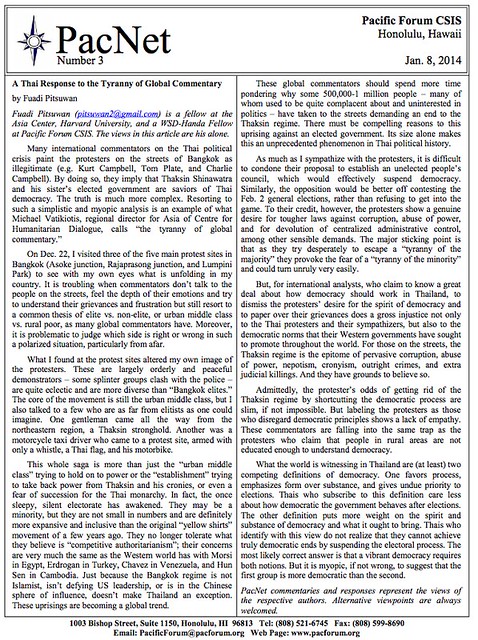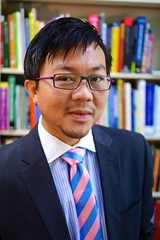Fuadi Pitsuwan, son of Surin Pitsuwan, former foreign minister, former ASEAN Secretary-General and a member of the Democrat Party, wrote an article, appeared in an online journal, PacNet, dated 8 January in response to what he saw as the “tyranny of global commentary.” Fuadi is currently a fellow at the Asia Centre at the prestigious Harvard University.

Fuadi’s Tyranny of Global Commentary
His family name may immediately indicate his political position without much elaboration. But in reality, members in the same family do not necessarily agree with one another in the realm of politics. In this case, the content of Fuadi’s article needs to be laid bare for further debates. He suggested that foreign commentators should work harder in trying to understand the current political phenomenon.
He began with referring to the likes of Kurt Campbell, former Assistant Secretary of State for East Asia and the Pacific, and famous American writer Tom Plate, for their misperception about the Bangkok protesters. To him, these foreign analysts tended to treat well-educated Bangkokians with disdain, seeing their anti-government protest as illegitimate. But in painting such picture, foreign analysts fell in the trap of assuming that the Yingluck government and Thaksin Shinawatra were icons of democracy. The reality was more complex. This kind of a prevailing opinion is called “tyranny of global commentary.”
Fuadi claimed to have done some fieldworks by visiting several protest sites and talked to some of the protesters. He found that they were not all from Bangkok. Indeed, a person whom he had conversation with indeed came from the remote Isan region, a Thaksin stronghold. Fuadi slammed foreign analysts for not doing their homework, failing to comprehend the frustration and anger felt by Bangkokians. These analysts wrote their commentaries in their comfortable office in far-away lands from Thailand. As a result, a simplistic view of the Thai crisis was made: a conflict between the elite and non-elite groups, between urban Bangkokians and rural poor. Fuadi cautioned that in time of highly politicised political situation, an attempt to point fingers at the “bad guys” is extremely elusive.
Fuadi also reproached foreign analysts for jumping to a conclusion too quickly, particularly in perceiving the current conflict as the intention of the elite to “take back” what Thaksin stole from them, in perceiving that the conflict being about the anxiety on the part of the elite regarding the imminent royal succession. He asserted that although the number of protesters in Bangkok might not be large, but it was not small and surely was broader than the yellow-shirt group seen in the past. They came out to voice their frustration against the so-called “competitive authoritarian”. This phenomenon, to Fuadi, could be detected in several countries, such as in the Middle East and its recent Arab Spring crusades.
Fuadi defended them by saying that although the protesters could amount to 500,000 to 1 million people, and some might not be previously politically conscious, it is now time for them to demand the deracination of the rotten Thaksin regime. Fuadi then engaged into a discourse of the Thaksin regime being the worst corrupt regime Thailand had ever experienced. He accused Thaksin for abusing power and condoning extra-judicial killings. He concluded his article by reiterating that there seemed to be two kinds of democracy: one focusing on forms rather substances, as seen in the urge to respect the election; and the other stressing on substances and how democracy could bring about political change. It is wrong for foreign analysts to accept the former as a better democracy than the latter.
Having read this article, I felt shocked. The author cannot run away from the fact that his article represents his political standpoint clearly. His article was crafted to counter the anti-Suthep mob among foreign commentators. This was the attempt of Fuadi to recreate a new image of the protesters and their anti-government campaign to be based on some kind of legitimacy. In reality, Fuadi hid many facts and tried to evade many questions posed by foreign analysts about the real intentions of the protesters.
First, although the depiction of the conflict between urban Bangkokians and rural residents might be too broad, but this kind of conflict provides an excellent discourse for the anti-government protesters, including Suthep himself, key personalities in the Democrat Party, celebrities, actors and actresses, civil society figures and numerous academics to continue to insult the rural residents as poor, stupid, uneducated and easily bought. Thus, it is not surprising that some foreign commentaries would focus on the dichotomy of rich versus poor and educated versus uneducated.
Second, it is rather sad for Fuadi, a distinguished scholar himself graduating from the prestigious Harvard University, refuses to read more about the real root causes behind the protracted corruption problem in Thailand. Fuadi assisted in generating a myth about Thaksin and corruption, even when in reality, the Democrat Party is not any less corrupt.
If Fuadi would spend sometime studying the works of Chris Baker and Pasuk Phongpaichit, he would understand that vote buying is no longer a key obstacle of democracy. Those in the rural areas have become politically awaken. Economic developments in the past few decades brought about a new identity of the rural residents who are now concerned more about political parties’ ideology rather than money. More over, the research conducted by Siriphan Noksuan Sawasdee confirms that in the last election of 2011, the Democrat Party spent more money than the Pheu Thai Party, and that vote buying could be detected more in the South and the Centre part of Thailand. Meanwhile, the research also shows that those with at least Master’s Degree tended to elect representatives from the Pheu Thai, not Democrat Party.
Third, the frustration among the urban protesters remains shallow. The real frustration was indeed felt by the rural residents who have long been marginalised in the realm of political power. Their electoral rights have often been taken away in countless military coups. Not to mention that some of them were brutally killed on the streets of Bangkok in 2010, by the Democrat-led government of Abhisit Vejjajiva, the party of which his father, Surin, belongs.
In the past, the so-called frustration of the urbanites was voiced through several shortcuts of power. They came out to support military coups, judicial coups, and resorted to the politicisation of the royal institution. What is happening in Bangkok is about the repeat of that history again. Bangkokians are creating a new definition of political deprivation even when they themselves have long controlled Thai politics.
In the end, I think Fuadi might be a part of the forces seen in Bangkok today in their last gasp of opportunity to defend their power position. This attempt has gone against waves of democratisation in Thailand and in the region. Perhaps, Fuadi may have been living abroad for too long thus failing to notice that Thailand’s political landscape has tremendously changed. The arbitrary discourse of the evil regime of Thaksin can not longer blind the international audiences of what is going on in Thailand.
His article can be seen at http://csis.org/files/publication/Pac1403.pdf

Pavin Chachavalpongpun is associate professor at Kyoto University’s Centre for Southeast Asian Studies.
Prachatai English is an independent, non-profit news outlet committed to covering underreported issues in Thailand, especially about democratization and human rights, despite pressure from the authorities. Your support will ensure that we stay a professional media source and be able to meet the challenges and deliver in-depth reporting.
• Simple steps to support Prachatai English
1. Bank transfer to account “โครงการหนังสือพิมพ์อินเทอร์เน็ต ประชาไท” or “Prachatai Online Newspaper” 091-0-21689-4, Krungthai Bank
2. Or, Transfer money via Paypal, to e-mail address: [email protected], please leave a comment on the transaction as “For Prachatai English”
